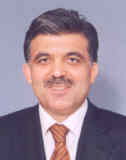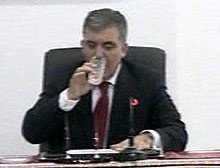Academics and analysts had evaluated Abdullah Gül during his candidacy, and had interpreted the controversy over the presidential office and the attitudes of army and state.
According to Prof. Dr. Serpil Sancar, the disagreement over the presidency was in fact related to redefining the identity and meaning of a president: "The disagreement is about who is to fix the norm." She had said that objections to Gül's candidacy had begun with the "Republican rallies" and that Chief of General Staff Yasar Büyükanit had said they wanted a "president who is laicist in essence, not just in words."
Gül had initially become a candidate on 24 April this year, three days before the scheduled presidential elections. When the Republican People's Party (CHP) boycotted those elections and the Constitutional Court then decreed that 367 MPs needed to be present in parliament for a quorum to be reached, the presidential elections were cancelled and early general elections were called. The Justice and Development Party (AKP) received around 46.7 percent of the votes in the 22 July elections and the party again nominated Gül as its candidate. Gül had interpreted the election results as approval for his candidacy.
Caliskan: The army will make peace with AKP conservatism
Assistant Professor Koray Caliskan of Bosphorus University (Istanbul), had said before the elections,
"Gül is acting strategically by making dangerous statements in a soft tone. It was him who started the trouble with Article 301. With such policies he will become closer to the army. The AKP and the army are actually not very different ideologically. Only symbols like the headscarf separate the party from the army. In the next twenty-five years, the army will make its peace with the conservative style of the AKP."
Mithat Sancar: Army is changing tactics
Prof. Dr. Mithat Sancar had predicted that the General Staff, which sees Cankaya, the presidential residence, as its area of dominance, would not change its line, but only its tactics by using indirect methods: "instead of forcing them to do what they want, not letting them do what they do not want. I do not believe they have given up on the 'e-memorandum'."
According to Sancar, "the presidential office was redesigned as a kind of guardian's office with the 1982 constitution and the president was given extraordinary powers. It was designed with the assumption that the republic would remain in the control of its 'wardens'. No one apart from someone from the 12 September regime or someone under their control was meant to go to Cankaya."
Baskaya: With Gül the AKP will move towards the centre
Assistant Professor Fikret Baskaya had been of the opinion that the AKP and the "state" had reached a compromise: "Showing Gül as a candidate can be interpreted as approval of a move towards the centre. In terms of the status quo, which needs a party that can keep the masses occupied and deluded, it is successful."
Baskaya argued that the current situation was what "big capitalists, imperial capitalism, the EU and the USA" wanted.
Tosun: Realpolitik
Assistant Professor Tanju Tosun had argued that the AKP had to pursue realpolitik for the sake of its own bourgeoisie. "That is why it will not dare to clash with the actors of the system."
"They may use a compromise formula like they did when Bülent Arinc was Parliament Speaker. Just as his headscarved wife did not attend receptions. Thus we could talk about a Hayrünisa Gül who was mostly in the "private space" rather than the "public space" of Cankaya.
Önen: AKP will complete its neoliberal economic model
Yavuz Önen, president of the Turkish Human Rights Foundation (TIHV), had complained that discussions about Cankaya "were eclipsing the vital problems". Önen had predicted that with Gül's presidency the AKP would be able to pass the laws which would "complete its economic model". The AKP was favouring capitalism over social rights. (TK/AG)












